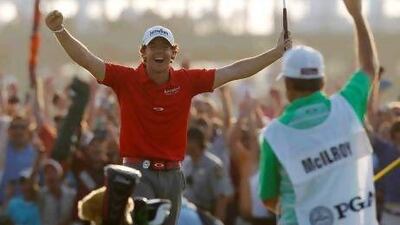Sometimes they seem lost without us.
What would professional athletes do if there were nobody to write or utter criticisms about them?
Would anybody ever win anything?
And to think the sports media ask for nothing in return except a good and fun living.
The latest to thank us without explicitly thanking us is the marvellous Rory McIlroy, who slaughtered the US PGA Championship last weekend, then lent gracious credit to that cloaked helper, criticism.
"Yeah, I don't think I could have answered it in any better way," he said on Sunday evening. "And yeah, to be honest, it did motivate me. I did want to go out there and prove a few people wrong.
"That's what I did. It took me all of four weeks to get my game back in shape and get out of my mini-slump, and this is the result."
Whew, thank goodness for prudish critics. What excellent fate that humans watching sport have become ever more finicky and unreasonable.
After all, careful research reveals McIlroy's birth year as 1989. Some of us have backaches older than him.
He is so young that when Scott Hoch famously missed a two-foot putt to enable Nick Faldo's first Masters title, McIlroy was still in the womb.
As of this time last week, he had played in a mere 15 major tournaments, won one, finished top-three in four and top-10 in five.
He had won a US Open by eight shots at age 22 years, one month.
In a rational world, anybody winning a US Open by eight shots at 22 years and one month ought to get an exemption from criticism until age 30.
At the trophy presentation, an official would announce: "And with his US Open title, Rory McIlroy gets the 10-year exemption to the US Open, the five-year exemption to the other three majors and the eight-year exemption from anybody impugning his golf." (Applause from remaining gallery.)
Instead, you know you're in a frenetic world just crawling with opinions when you win a US Open by eight and then some people think there's a hint of a crisis because your next five majors went T-25, T-64, T-40, cut and T-60.
What's wrong with you, man?
In a sad world, just look at the two options facing somebody winning a US Open by eight shots at age 22:
Option A: roam the Earth, turn up on this continent and that, make appearances both inside and out of golf, go to a beach now and then, enjoy time with famous tennis professional girlfriend, play well enough to win a professional tournament in March anyway.
Option B: grind on. Win more majors. Now.
On the one hand, people have a point about any unused big talent, but on the other, people have a better point about enjoying life when somebody 22 and 23 happens to own a chunk of the world.
When in doubt, hang out with the latter people.
Now at 23 years, three months, McIlroy has won two of the 16 majors he has entered, won both by eight strokes and displayed such mastery he can come to No 18 with a seven-shot lead on the alleged toughest course in America and toy with it, hankering to win by eight rather than seven.
In the United States, anyway, athletes have spoken of proving critics wrong for so long that, for a while at least, it seemed a mandatory part of the championship process.
A championship event would have a pre-game traffic jam, a rendition of The Star-Spangled Banner, a beginning, a middle (often a half-time), an ending, a presentation of the cup, a post-game traffic jam and a recital of, "We proved the critics wrong".
Sometimes you'd wonder why they didn't just have a parrot on hand to enunciate the sentence and save everyone the trouble.
It grew so tiresome over the years that it seems that maybe even the athletes themselves tired of it, and in this very summer we have something of a new realm, both LeBron James and McIlroy crediting the criticism as if happy to have known it.
From here, who knows?
McIlroy might have another sort of mini-slump somewhere along the line in the brutal sport he plays so beautifully.
He might not win any of the ensuing five majors, the louse!
In that case, it might be time again to point out that his priorities have devolved to distortion.
Then, maybe, he can take a four-week retooling, win hugely again and cite obliquely those diligent, selfless, grumpy souls out there ready to lend the pivotal, unflattering words.
We have shown time and again we are happy to help out.
Follow us

